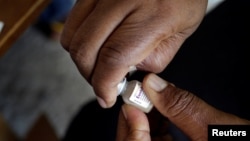The U.N. stabilization mission in Haiti is administering cholera vaccines to a police unit from India months after it arrived in the impoverished Caribbean nation without the required protection, officials said Tuesday.
The failure to ensure that U.N. police personnel from a cholera-endemic country were vaccinated comes after the waterborne disease was introduced to Haiti's largest river in October 2010 by sewage from a base of U.N. peacekeepers from Nepal, one of the units that have rotated in and out of a multinational force here since 2004.
Over six years later, Haiti continues to wrestle with the globe's worst outbreak of the preventable disease in recent history. Cholera has sickened roughly 800,000 Haitians and killed at least 9,500.
Vaccination for cholera is now mandatory for all U.N. troops and police deploying to peacekeeping operations. The U.N. puts responsibility for peacekeeper vaccinations on member states, according to Ariane Quentier, spokeswoman for the U.N. mission in Haiti.
But critics say failure to enforce the vaccination requirement with the 140-member Indian police unit is another breakdown in the world body's effort to minimize the risks of introducing epidemics by rotating UN troops.
"It cannot duck its own responsibilities by pointing its fingers at the countries that supply the troops," said Brian Concannon, executive director of the Boston-based advocacy group Institute for Justice and Democracy in Haiti.
Quentier told The Associated Press that the Indian police unit has received second cholera vaccine doses this week "to take in the coming hours, days." She said it was one of three police units from India, and the others were fully vaccinated.
At a Monday press briefing at U.N. headquarters in New York, Stephane Dujarric, spokesman for the U.N. secretary-general, told reporters that the world body was looking into the situation and "trying to get more information, obviously, from the Indian authorities."
The U.N. last month acknowledged not doing enough to help Haiti fight cholera, while stopping short of an admission of responsibility for introducing the disease. It has announced a new $400 million fundraising plan to battle cholera and assist victims in Haiti. The proposed plan would equip rapid response teams for areas where cholera cases are reported and would also try to boost Haiti's underfinanced sanitation and clean water systems.
Spread by contaminated water, cholera is easily treatable but can lead to death within hours if unattended. It showed up in the hemisphere's poorest nation 10 months after a devastating earthquake in the south of Haiti, deepening the country's misery at a time when it was ill-equipped to cope with a second crisis.




